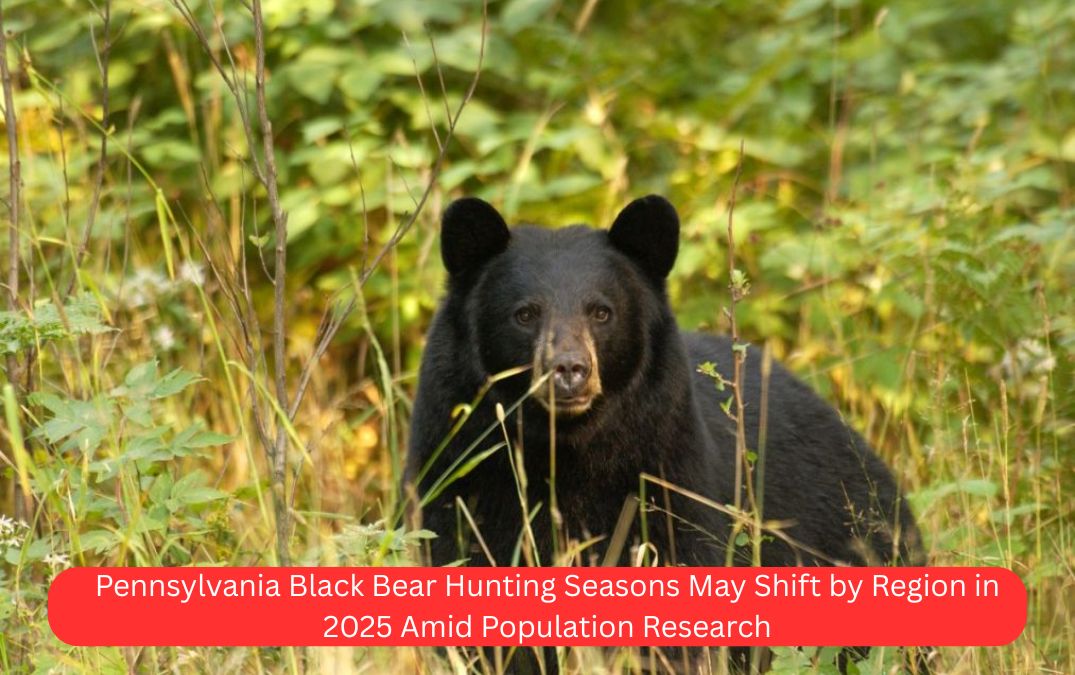Pennsylvania’s black bear hunting regulations could soon be adjusted based on regional data, as wildlife officials study bear populations and hunting impacts statewide.
With harvest numbers down in 2024, the Pennsylvania Game Commission is exploring new strategies to stabilize the bear population through localized season adjustments.
What Happened
Black bear hunting in Pennsylvania may undergo changes in 2025. Wildlife officials are considering regional season adjustments based on population trends, hunter feedback, and public safety concerns.
In 2024, hunters harvested 2,642 bears across 56 of the state’s 67 counties. That figure marked a decline from 2,920 bears taken in 2023, with the regular firearms season seeing the lowest harvest numbers since 1982.
Key Details
- 2024 Bear Harvest: 2,642 bears, compared to 2,920 in 2023
- Lowest firearms harvest since 1982
- Main contributing factors: Poor weather in some regions and earlier hibernation of females
- New Strategy: Shift from statewide to regionally defined seasons
- Population Estimate: 19,211 black bears in PA (range: 16,146 to 23,005)
Snavely, the state’s black bear biologist, emphasized that population stability and public input will drive changes. Currently, a statewide archery season reduction (from three weeks to one) has already been implemented.
Reactions or Statements
Brandon Snavely, the Pennsylvania Game Commission’s black bear biologist, explained the reasoning:
“What we are working on now is a defined season-setting structure. Some areas would have slightly expanded or contracted seasons based on what we’re seeing from both the population and conflict and everybody’s opinions.”
He also noted:
“If you look at it across the state, it’s up or it’s down and you change everything for everything. It probably can be done in a more exact way.”
Snavely is overseeing a multi-year research initiative involving 640 radio-collared bears across all regions of Pennsylvania.
Investigation or What’s Next
Snavely’s team, including a Penn State graduate researcher, is monitoring bear survival, reproduction, and habitat use. The four-year study will help inform future management decisions.
As of now:
- 160 new radio collars are placed each year
- Study includes male and female adult bears, as well as yearlings
- Collar data will track causes of death, denning patterns, and human conflict potential
The Game Commission may soon finalize a region-based season structure, especially affecting archery, muzzleloader, and extended seasons.
Bear Behavior and Safety This Summer
Mother bears are now chasing off their 16-month-old cubs, and July will bring the peak breeding season. Yearling males may wander into residential areas.
To avoid bear encounters:
- Secure trash and store garbage indoors until pickup
- Remove bird feeders and outdoor pet food at night
- Avoid feeding bears, which could lead to euthanasia of the animal
“They’re giving that bear a death sentence,” said Snavely about those who intentionally feed bears.
2025 Black Bear Hunting Season Schedule
| Season Type | Dates | Applicable WMUs / Details |
|---|---|---|
| Archery | Sept. 20–Nov. 28 | WMUs 2B, 5C, 5D (varied) |
| Archery | Oct. 4–Nov. 21 | WMU 5B |
| Archery (Statewide) | Oct. 18–25 | All WMUs |
| Muzzleloader | Oct. 23–25 | Statewide |
| Special Firearms | Oct. 23–25 | Eligible hunters only |
| Rifle (General) | Nov. 22–25 | Statewide |
| Extended Firearms | Nov. 29–Dec. 6 | WMUs 3A, 3B, 3C, 3D, 4C, 4E, 5A |
| Extended Firearms | Nov. 29–Dec. 13 | WMUs 2B, 5B, 5C, 5D |
Hunters must purchase a bear license in addition to a general license and are allowed to harvest one bear annually.
FAQs
How many black bears live in Pennsylvania?
An estimated 19,211 bears, with a range between 16,146 and 23,005.
Why was the 2024 bear harvest lower than usual?
Poor weather and early hibernation of female bears, especially pregnant ones, contributed to the drop.
Will hunting seasons be different across regions in 2025?
Possibly. Officials are considering adjusting seasons based on local bear populations, conflicts, and public feedback.
What should I do if I see a bear near my home?
Remove all food sources (trash, bird feeders, pet food), keep your distance, and avoid interacting with the bear.
Why is feeding bears dangerous?
It creates dependency and increases the likelihood of human-bear conflicts, often leading to the bear being euthanized.
Summary / Final Takeaway
Pennsylvania’s black bear hunting seasons may soon be tailored regionally to better manage population health and reduce human conflict.
With research efforts underway and 2025 seasons already scheduled, hunters and residents alike are encouraged to stay informed and practice safe coexistence with the state’s bear population.












